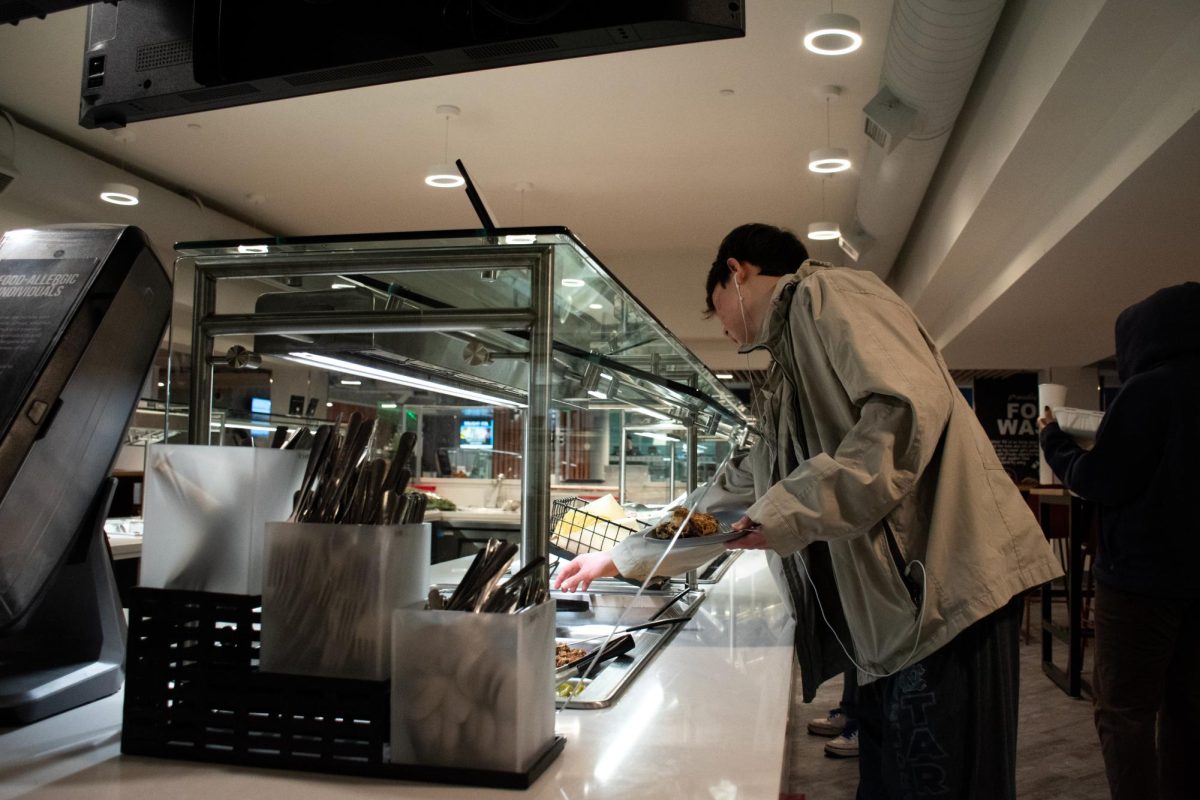Students have reported falling ill after eating at Thurston and Shenkman dining halls since the end of last semester and point to undercooked meat as the cause.
More than a dozen students said they got sick after eating at the dining halls in Thurston and Shenkman halls since the end of last semester, with at least two seeking medical attention at GW Hospital. At least two students said they complained to GW Dining and dining hall management after getting sick, and at least four students said their illnesses caused them to miss class.
Ella Weiss, a first-year political science and criminal justice student, said she experienced stomach illness around Jan. 23 after eating meatballs and chicken in Thurston Hall. She said she went to the emergency room after experiencing intense nausea but left after not receiving help for several hours.
She said her family contacted GW Dining to secure alternate meal accommodations outside the dining halls, but they “have not really been responsive.” Weiss said she skipped the rest of her classes the next day after almost vomiting in her first class.
She now avoids food from the two dining halls, opting for groceries using her GWorld dining dollars and meals from District House.
“I just really don’t want to get sick again,” Weiss said. “So I’m kind of avoiding that.”
University spokesperson Julia Metjian said officials have received reports of stomach-related illnesses and undercooked chicken in Thurston Hall. Metjian said a University investigation through the Student Health Center concluded the stomach-related illnesses were not caused by food poisoning from the dining halls.
Metjian did not specify when the investigation took place, or the cause of the “stomach-related illnesses.” She said the University retrained staff and strengthened its quality-assurance procedures, which include monitoring cooking and holding temperatures. She added that GW will hire a “qualified food safety manager” to improve food quality further.
“Food safety is our number one priority at GW Dining, and we are constantly monitoring and improving our training and quality control procedures,” Metjian said in an email.
Students have posted several images of what appeared to be raw food at GW dining halls on Reddit, including one photo from a group chat of parents with children residing in Thurston Hall that appeared to show a pushpin baked into a cookie at the dining hall.
The dining hall in Thurston, which opened in 2022, received six violations during an October 2023 inspection by the DC Department of Health that required “corrective actions.” These violations included a lack of soap at a hand-washing sink, a leaky pipe and insufficient cooling of refrigerator drawers. The violations were resolved, according to a follow-up inspection.
The Student Government Association created the Special Committee on Dining Reform last May to address student concerns over health violations in the dining halls, including the discovery of mouse droppings at The Eatery at Pelham Commons. Students with allergies also expressed concern over contaminated food in the dining halls last spring.
Sophia Pan, a first-year interior architecture student, said she is now cautious while eating at the dining halls after she got sick from eating “old and gross” cream cheese at the dining hall in Shenkman Hall last semester.
“The week after I got sick I kind of just stuck with District, Panera and Chipotle,” Pan said. “I just didn’t want to risk it for a bit.”
Last March, students at Missouri State University reported undercooked meat and improper refrigeration at their dining hall, which is run by Chartwells — the operator of GW’s dining halls. The company also runs dining at Suffolk University, which pledged in 2021 to improve the quality of its meal services after several students reported food poisoning.
Georgia Raser, a first-year psychology student, said she contacted Matthew Thompson, the vice president of operations under Chartwells at GW, after she got sick from grilled chicken at Thurston Hall earlier this semester. Raser said Thompson called her but never again followed up with her.
“We pay a lot of money for dining plans here, and we’re forced to have a dining plan,” Raser said. “That’s just not what we want to have to deal with.”
Raser said now she only takes prepackaged items from the dining halls.
“I’ve been going to the grocery store, eating out a lot, which I feel like it shouldn’t be forced upon students to feel like they have to spend more money than that outside of the dining hall,” Raser said.





